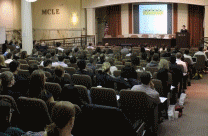Public Records & Open Meeting Law
What you need to know about the public's right to know

- Product Number: 2230055P01
-
CLE Credits, earn up to:
3 substantive credits, 0 ethics credits CLE Credit Note - Print Brochure
-
Add to Favorites List
Choose Date/Location:
-
Product Description
Product Description
Open government is a cornerstone of our democracy—and is advanced at the state and local levels by the provisions of the Open Meeting Law and the Public Records Law. The level of openness these laws require—and the mechanisms which enforce public access—are important to the governmental officials, counsel for governmental bodies, and members of the public and media who wish to monitor meetings and actions. The expert panel addresses the current state of the Public Records Law and the Open Meeting Law individually, as well as their interaction in the context of local and state government.Join us online as our expert panel discusses recent as well as evolving Public Records Law trends and issues. Highlights include recent changes to exemption language as well as changes to the Public Records Law regulations. The faculty discuss emerging topics and best practices including exemption claims, identifying and separating large requests from harassing requests, and strategies for responding to both, as well as managing request responses during the COVID-19 pandemic. Additionally, the panel discusses relevant and important updates within the Open Meeting Law, such as what constitutes deliberation, the requirements for meeting notices and other deadlines, whether remote access to the public is required, and whether there are differences for executive meetings. Also learn what issues continue to emerge with the use of new technologies and their effects upon government function and public access in the scope of both laws and especially during the pandemic and beyond.
- Agenda
- Faculty

